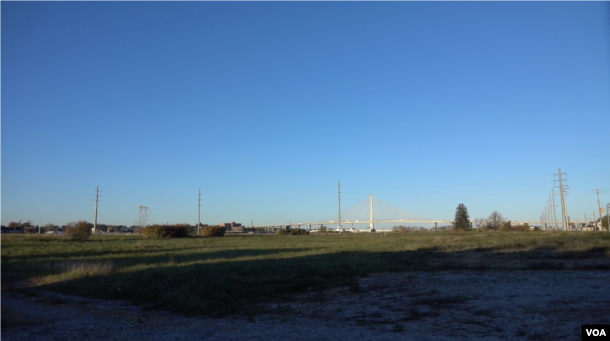
Spurned by Chinese Investors, Ohio City Looks to Trump
TOLEDO, OHIO — Like many American cities, Toledo, Ohio, is always seeking new development opportunities.
Its riverfront Marina District once was home to a factory that was shuttered when the steel industry declined in the 1980s. The district still has commercial potential, but securing development funding is tough.
Although a recent wave of Chinese investment gave some residents a sense of hope, it was fleeting.
«The original plan for the Marina District was to develop it into a commercial or industrial or mixed-use center where there’s living, entertainment and business,» said Paul Zito, vice president of Regional Growth Partnership, a Toledo development group.

Securing development funding for this large parcel of riverfront property has proven difficult for city officials representing the Marina District in Toledo, Ohio, Nov. 6, 2016. (C. Yu/VOA News)
Investment boost
«In 2011, Toledo saw some great transactions of real estate from several Chinese companies and individuals,» he told VOA. «Acquisitions of city-owned properties, such as the Marina District, an old [brownfield site] in the city — the docks, a row of restaurants, and the Park Inn Hotel — the total value of these three investments was around $15 million. They were very welcome by the city and by the business community.
«Unfortunately, the business community in Toledo thought that would trigger the immediate influx of billions of dollars from China. That did not happen.»
The billions of dollars of investment revenue never materialized, nor did proper development and construction plans. This year, the 69 riverfront acres were sold to ProMedica, a Toledo health care system, and the latest plan is to build a city park there.
«It looks like the investments got buried underground,» said Lucas County Commissioner Pete Gerken. «There was no job created after that. In fact, taxpayers had to buy it back. There was an investor that came in town, took a piece of taxpayer-produced property on the river, [held it] for 3½ years, and then did nothing with it. That’s lost opportunity.
«We welcome investors in Toledo,» he added. «Toledo needs partners, not people turning it into a parking lot.»
Daxing Taiping Company, the Chinese company that once held the riverfront parcel, did not respond to multiple requests for comment.

Securing development funding for this large parcel of riverfront property has proven difficult for city officials representing the Marina District, Toledo, Ohio, Nov. 6, 2016. (C. Yu/VOA News)
Lack of clear strategy
The primary problem, Zito said, is that many well-financed Chinese companies have the resources but not the clear investment strategies — nor a grasp of the local market — to make a go of large-scale development projects.
«Five years ago, many Chinese companies had a lot of access, cash, and thought that the U.S. was the Wild West — [that], if they invested their money, it would simply grow,» he said. «They didn’t realize that the U.S. has its own set of regulations and laws that can be very complicated for an overseas company.»
He remains convinced that international investment could still prove catalytic for Toledo’s economy. While many foreign companies offer higher wages and superior benefits, and are generally more stable than U.S. firms, he said, Chinese companies don’t necessarily fit that mold.
«The way the Chinese invest is still like the way the Japanese invested in the U.S. in the 1960s to ’70s,» he said. «They would rather buy and sell tangible real estate. They are not interested in long-term investment in industry.»
Job creation
Like many American cities, Toledo needs more job opportunities, and some locals still hope to revive its once-thriving manufacturing sector. While some voters believed former Secretary of State Hillary Clinton would have been the best president to help them do that, others strongly Donald Trump, now the president-elect.
«The old Jeep industrial site where I spent 30 years — we have thousands of new jobs coming to that plant because [Hillary Clinton] kept the industry alive,» said Gerken as he stood outside the Lucas County job-training center. «This is where we train workers for jobs. We got money to do that from the federal government. She made a commitment to continue to bring federal funds to Toledo, so we could train workers and retrain workers. That’s how we get our jobs back — training workers.»
Those who backed Trump, however, have a different perspective.
Scott Prephan, president of Five Lakes Global Realty, travels to China every other month as part of an effort to attract Chinese investors to the U.S. Based on that experience, he said, Trump was the obvious choice.
«Trump is an expert in creating jobs and running business, so he’s the best candidate for creating local jobs,» he told VOA.
«There is curiosity,» Prephan said of how Chinese investors are anticipating the way in which a Trump White House will govern.
«Their major concerns include whether there will be a stable business climate, or a stable economy,» he said. «But they are still interested. I haven’t seen any negative reaction to it.»
This report was produced in collaboration with VOA’s Mandarin Service.

